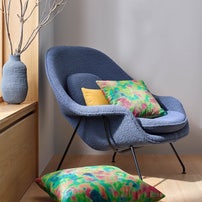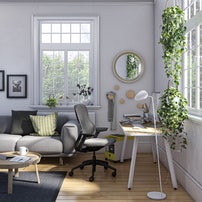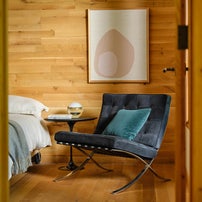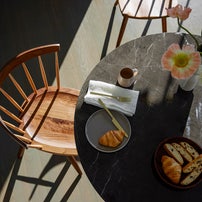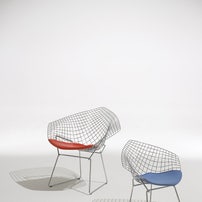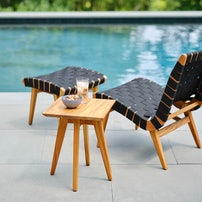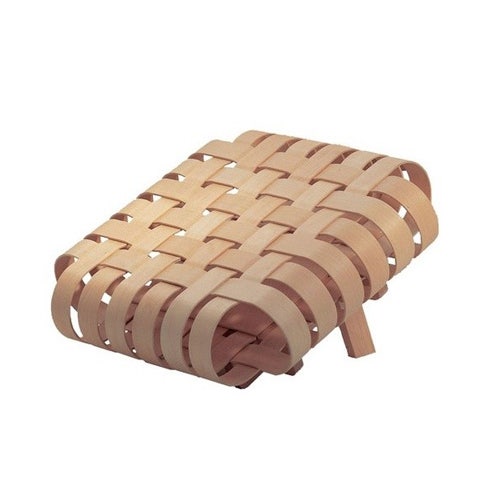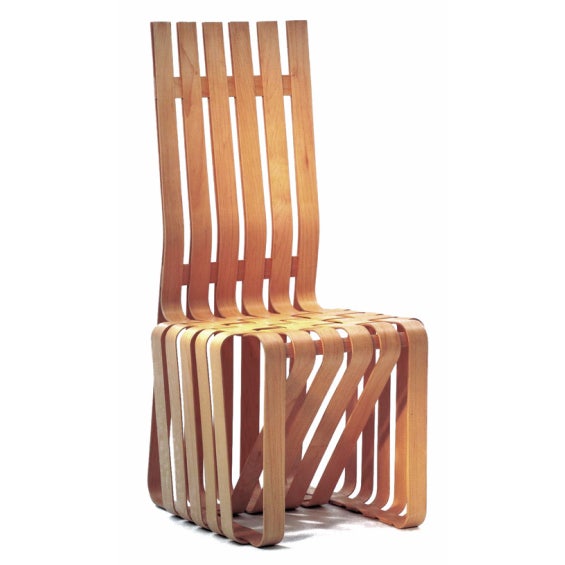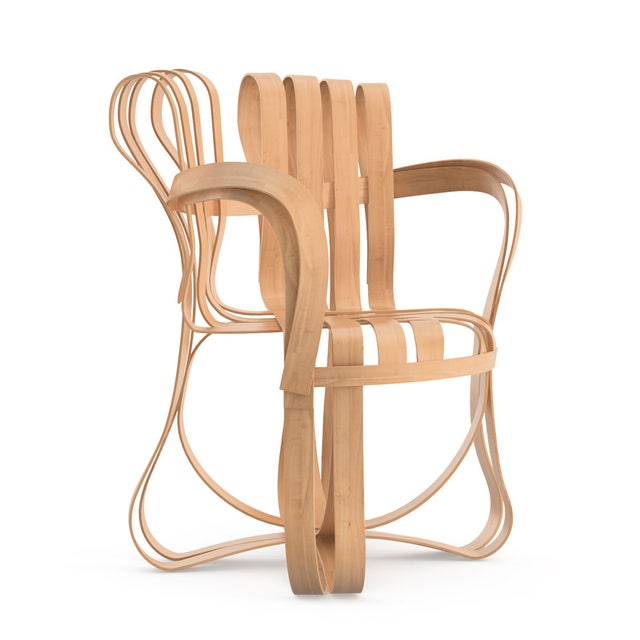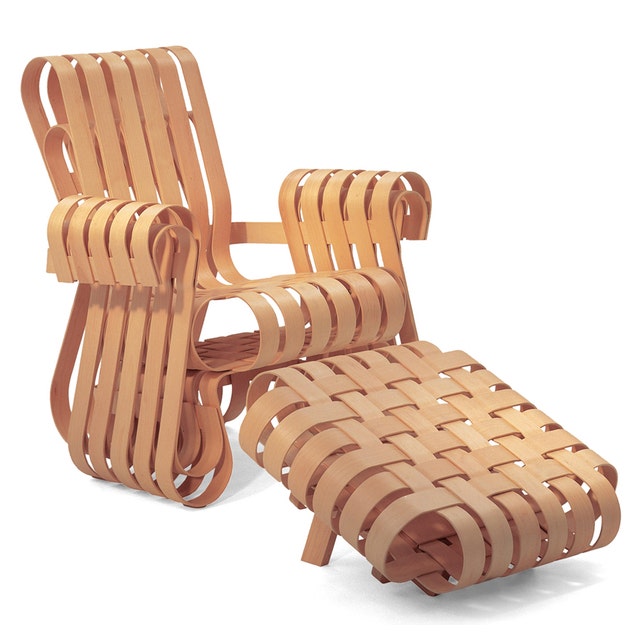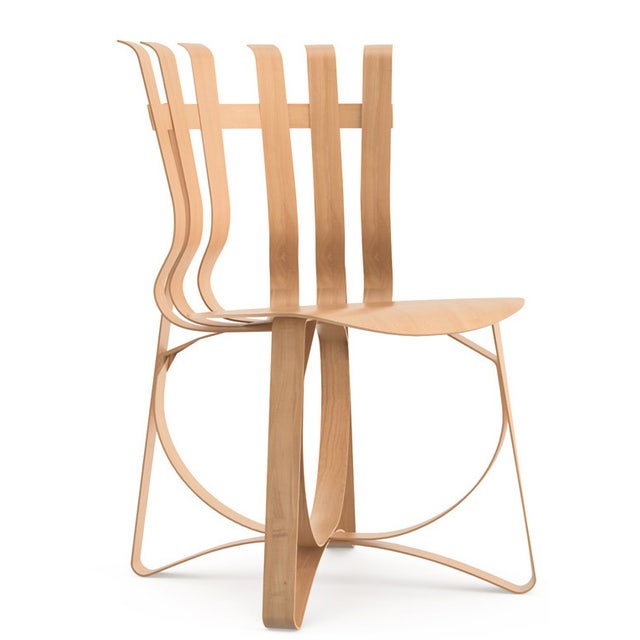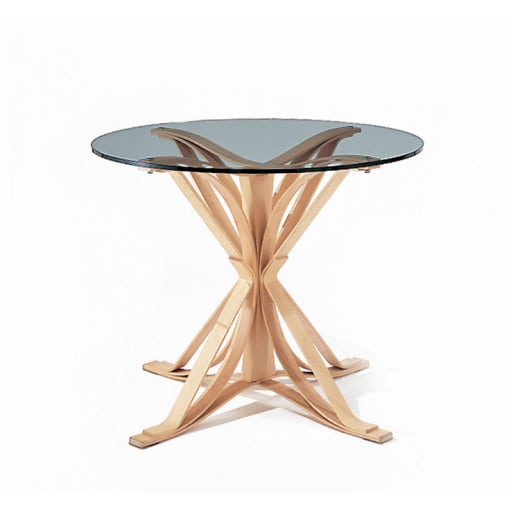Knoll Frank Gehry - Hat Trick Arm Chair
Neither party knew what lay ahead when Frank Gehry came to Knoll in 1989 with an idea for a new generation of bentwood furniture inspired by the simple bushel basket. Despite the uncertainty, a studio was set up and, fueled by mutual optimism, the investigation began.
"Everything I’ve always done has been a reaction against the usual expectations of the furniture market. I wanted the chair to come out of my own work, the shapes of my buildings… What the Knoll people first said to me was, ‘It probably won’t work, but maybe it will. You’ve been thinking about it. Something will come of it.’ All bentwood furniture until now has relied on a thick and heavy main structure and then an intermediary structure for the seating. The difference in my chairs is that structure and the seat are formed of the same incredibly lightweight slender wood strips, which serve both functions. What makes this all work and gives it extraordinary strength is the interwoven, basket-like character of the design… It really is possible to make bentwood furniture pliable, and springy and light."
After three years of experimentation and exploration, the collection was debuted in the Frank Gehry: New Furniture Prototypes show at The Museum of Modern Art in New York.
Inspired by the surprising strength of the apple crates he played on as a child, Frank Gehry created his thoroughly original collection of bentwood furniture. The ribbon-like designs transcend the conventions of style by exploring, as the great modernists did, the essential challenge of deriving form function.
MEASUREMENTS:
- Height: 85 cm / 33.5 inch
- Width: 59.6 cm / 23.5 inch
- Depth: 56.3 cm / 22.2 inch
- Seat Height: 45.7 cm / 18 inch
- Arm Height: 66 cm / 26 inch
MATERIALS:
- Frame in 2" wide hard white maple veneers laminated to 6 to 9-ply thickness with high bonding urea glue
- Cushions in 1/2" thick high resiliency foam
- Glides in clear plastic with matte frost finish
HELPFUL NOTES:
- Greenguard Indoor Air Quality Certified®

Frank Gehry
Canada, 1929
Born in Canada, Gehry is a naturalized U.S. citizen. In 1954, he graduated from the University of Southern California and began working full time with Victor Gruen Associates, where he had been apprenticing part-time while still in school. He was admitted to Harvard Graduate School of Design to study urban planning. When he returned to Los Angeles, he rejoined Gruen where he stayed until 1960. After a brief sojourn to Paris, Gehry returned to LA and set up his own firm.
Gehry’s early work used unfinished qualities as a part of the design, incorporating chain link and other common building materials. Gehry’s architecture was known for its reliance on harsh, unfinished materials and its juxtaposition of simple, almost primal, geometric forms. In 1972 he introduced a series of corrugated cardboard furniture under the name Easy Edges. The Easy Edges, and particularly the Wiggle Chair, were extraordinarily sturdy and due to their surface quality, had a noise-reducing effect in a room.
The Easy Edges were a great success and brought Gehry overnight fame as a furniture designer. Gehry created his bentwood furniture collection for Knoll in 1992. Inspired by the surprising strength of a wooden bushel basket, he sought to fully integrate material and design to create a structurally and aesthetically light masterpiece. He has won numerous international awards and prizes, including the Pritzker Architecture Prize for his significant contributions to architecture and the built environment.

Knoll has lived their guiding principle, "good design is good business," since 1938. Products are all created to inspire, fit, and last. The Bauhaus philosophy that furniture should complement, not compete with architecture, is central to Knoll’s design. Its extensive portfolio includes office work systems, residential mid-century modern classics, textiles, and accessories.
Designers like Harry Bertoia, Eero Saarinen, Warren Platner, Isamu Noguchi, and Florence Knoll contributed to Knoll’s iconic designs. Knoll invests in research and field studies and explores organizational behavior and technology to ensure quality excellence. As a leader in sustainability, Knoll’s practices reduce waste and conserve resources. Based in Pennsylvania, Knoll has a strong international presence, and 40 products are in the permanent collection of the Museum of Modern Art in New York.
Knoll products incur a 7.5% shipping charge at checkout, with a minimum of $85 and maximum of $500. This fee reflects White Glove Delivery for large items, which includes bringing the item to your room of choice, unpacking, removal of packaging, and assembly.
For further information on our shipping policies click here.
For further information on returns + refunds click here.


